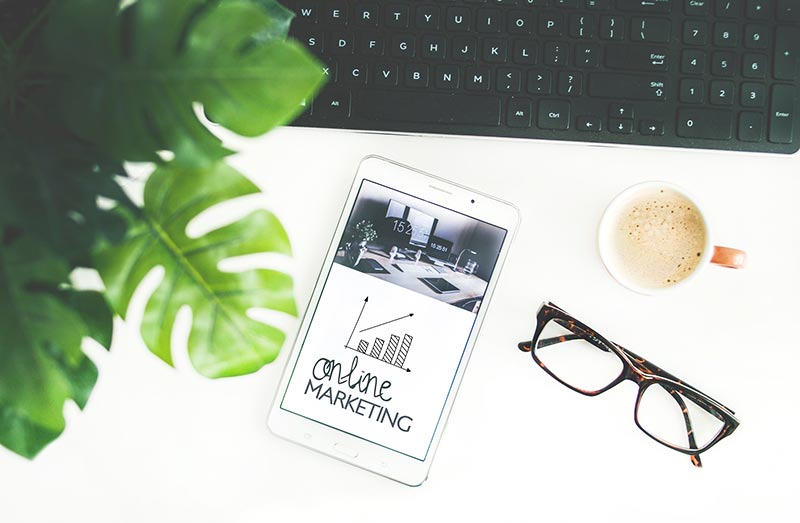What is Green Marketing? If you're looking for a clear answer to this question, you've come to the right place! The future belongs to companies that work sustainably. They combine profitability with the lowest possible environmental impact and fair trade, thus attracting attention and achieving long-term success. Not least because sustainability is playing an increasingly important role for consumers.
However, advertising and public relations work geared towards sustainability requires honest, transparent action and a clear strategy.
In this article, I would therefore like to provide you with everything you need to know about ecomarketing. From the definition, types, characteristics, the marketing mix, advantages and disadvantages, to strategies and examples. Finally, I will also give you some valuable tips for practical implementation. Let's go!
Here is a brief overview for you in advance:
- Definition
- Types
- Features
- Marketing mix
- Advantages and disadvantages
- Strategies and examples
- Tips
- Closing words
Definition: What is Green Marketing?

Green marketing or ecomarketing refers to the sales-promoting activities of a company with the deliberate aim of helping to plan, coordinate, implement and control all market-oriented transactions. to bring about a prevention and reduction of environmental pollution.₁
In comparison to conventional marketing activities, green marketing takes into account ecological and ethical decision-making criteria in addition to customer and competition orientation. Conscious and honest environmental thinking consequently increases a company's sales opportunities.
This form of marketing is also commonly referred to as Green marketing, Environmental Protection Marketing, sustainable marketing or ecology-oriented marketing.
Types: What forms does sustainable marketing take?
Since definitions are usually a bit dusty in nature, I have listed the main types and characteristics that you can use to practice green marketing or by which you can recognize green marketing.
- Passive: As the name suggests, your own marketing activities basically automatically become more sustainable because (new) laws and regulations are complied with or implemented.
- Selective: Companies allow their own activities to be guided by the behavior of the competition and at most make a few attempts on their own initiative.
- Internal: This category includes companies that are environmentally and socially compatible with the processes within the organization, but less so with the products they offer to the outside world.
- Innovative: Environmental protection and sustainability are a priority here. Both internally and externally. A comprehensive strategy is developed and credibly implemented to solve specific grievances or environmental problems.
Characteristics: How can you recognize sustainable marketing?

Here are some characteristics and modes of action by which you can recognize companies with serious, sustainable marketing strategies:
- Sense of responsibility
- Resource conservation
- Longevity
- Environment
- Fairness
- Economic efficiency
- Relevance
- Storytelling
- Honesty
- Transparency
- Conviction
- …
Ecological and economic as well as social aspects must be taken into account in ecomarketing. The most important thing is, to be absolutely honest and transparent with people and potential customers.
Businesses with a sustainable marketing strategy emphasize, for example, the fair manufacturing process, the organic and recycled materials, the energy-saving work processes or the ecological benefits of their products. It is reported honestly, extensively and in detail.
Difference from greenwashing: The negatively charged concept of the Greenwashings refers to deceptive marketing measures that portray a company or individual products as particularly environmentally friendly and sustainable, even though they are not. Greenwashing is therefore superficial and neither honest, nor relevant, nor economical - because in the long term it harms a company more than it helps. Anyone who tries to lie to and deceive their own target audience will lose in the end.
Coordination: What does a sustainable marketing mix look like?

As I studied online marketing, I naturally absorbed and internalized the classic marketing mix. But how about simply combining the four points with the aspects of sustainability. Then the 4 P's of green marketing would look something like this in terms of content:
- Product policy (Product): Products and services offered contribute to the protection of our environment and ideally even combat existing environmental problems, such as the Deforestation of the rainforests.
- Pricing policy (Price): The price range is usually somewhat higher in green marketing. Customers are prepared to bear the additional costs arising from environmental aspects to a certain extent as long as the company's work is transparent and the measures are plausible.
- Distribution policy (Place): A company's distribution and transportation routes are important for green marketing, especially in terms of sustainable mobility. Companies that organize themselves in an environmentally friendly and resource-saving manner enjoy great advantages.
- Communication (promotion): All advertising measures should be communicated in the most environmentally friendly way possible. For example, companies that engage in green marketing usually communicate the content of their offer digitally in order to Save paper.
Advantages and disadvantages: What are the pros and cons of green marketing?

In the following, I would like to take a look at the advantages and disadvantages of sustainability marketing. You will quickly realize that the opportunities clearly outweigh the risks.
Advantages and opportunities at a glance
What reasons do entrepreneurs and employees have to only engage in green marketing in the future? And what exactly encourages customers to give preference to sustainable companies? Here are a few opportunities and benefits associated with this form of environmentally conscious public relations work:
For companies themselves
- Greater trust. For example, from customers who notice that sustainability is a top priority for the products on offer.
- Deeper identification of employees. For example, because employees know that they are doing good with their work.
- Growth. For example, through greater awareness as a result of the elimination of environmental problems.
- Image improvement. For example, durable, reusable products and serious environmental and climate protection in the company.
- Cost savings. For example, through shorter transportation routes and less packaging material.
- Additional unique selling point. For example, because the ecological added value of a product represents a further USP (Unique Selling Proposition).
Basically, acting sustainably has no real disadvantages for anyone. From a company's point of view, however, one could mention the potentially more difficult search for suppliers and the risk of slipping into greenwashing due to the often higher production costs and the associated new pricing policy.
For our company
- Less greenwashing. As a consumer, you find trust in certain brands that prefer honest, green marketing. This in turn minimizes the chances of success for companies that practice greenwashing.
- Health. Working in fair and sustainable companies lets you work in a Acting in a job that makes you happy.
- Fairness. Many companies that consciously pursue sustainable marketing also work sustainably internally - and ensure fair working conditions and appropriate pay, for example.
- Good conscience. As an employee:in fair and environmentally conscious companies, you know that you are doing something good and creating added value for yourself, but also for nature and our society.
- Job Opportunities. The chances of keeping your job in the long term are often greater at sustainable, future-oriented companies. Get involved in the Job portal for sustainable job advertisements inspire.
- Clarification. Green marketing generates attention for the Environmental problems of our time and contributes to their solution. In addition, the Environmental awareness in society.
Sustainable marketing by companies has no real disadvantages for consumers either. I could mention the often higher product prices here. However, a counterargument is that sustainable products are usually much more durable. It should also not go unmentioned that you can save a lot of money through serious sustainable behavior can.
Disadvantages and risks at a glance
Green marketing therefore has a whole range of advantages. Even though I have already touched on the few disadvantages, I would of course like to summarize the dangers and risks here again and add a few things:
- High adjustment costs. Switching to organic products (e.g. from organic farming or organic forestry) can be somewhat more expensive. As a rule, obtaining organic certification is also not free of charge. Companies then have to accept the increased costs or pass them on to their customers. In the long term, however, the investment is usually worthwhile for the company itself, for consumers and for the environment.
- Possible problems with suppliers. It may be that long-standing business relationships have to be abandoned because your company wants to pursue green marketing and only offer organic products, for example. It may be difficult to find suitable suppliers. However, sustainable action never works without change and should not fail due to a lack of suppliers.
- Danger of greenwashing. If sustainability marketing is only half-heartedly planned and implemented, it can quickly be interpreted as greenwashing. This can result in shitstorms and permanent damage to the company's image, for example. However, this risk can be minimized through a transparent strategy and the integration of green marketing into the overarching corporate philosophy.
5 Strategies and examples for the practical implementation of green marketing

I have now explained the definition, types, characteristics, the marketing mix and the advantages of this promising form of modern marketing. But what does it all look like in practice? Here you will learn many practical examples as well as tips for implementation in your company.
1. philosophy & storytelling
The philosophy of a company and sustainable storytelling are examples of long-winded but the more effective marketing strategies in the long term. Companies that assume social responsibility and work transparently will enjoy major competitive advantages over time.
Example 1: A StartUp regularly makes Sustainable company outings and supports clubs in cleaning up beaches, for example. The photos are shared on social media.
Example 2: A company that sells drinking bottles prints them with inspiring messages for environmental protection and uses part of the proceeds to promote Founders in the implementation of further, sustainable business ideas.
2. green promotional items
The image of promotional items has suffered somewhat in our society. This is because they are often equated with cheap, disposable items. However, there are now also many suppliers who deliberately avoid resource-saving, fair and sustainable production and use of their promotional products.
Example: A company that sells promotional products as cheap mass-produced goods makes a conscious decision to only offer durable items made from recycled or organic raw materials that are produced under fair conditions.
3. campaigns without direct product reference
A company's campaigns do not always have to focus on the product on offer. Instead, a Initiative that promotes conscious, sustainable action in our society, for exampleThe aim is to create new trust, generate great interest and ultimately also increase sales figures.
In this way, green marketing can also work without a product-related message - and thus combine success and environmental protection.
Example: A trade fair organizer for sustainable business advertises with large posters in the subway that capsule coffee should be avoided because it produces 8,000 tons of waste every year and costs €70 per kilogram almost unnoticed.
4. donations to social projects (cause-related marketing)
This form of green marketing is somewhat controversial. Often it is not the product, but only the promised additional service sustainable. However, this type of ecomarketing really makes sense from many points of view.
After all, you are selling a product, motivates potential customers through donations to animal welfare organizations or other social enterprises and also informs society about existing grievances and institutions worthy of support. The company's own image is promoted - and this in turn increases the chances of long-term success.
Example: A company that offers organic nut bars, organic hand soaps and mineral water donates - with complete transparency - a meal for every bar purchased, a bar of soap for every hand soap purchased and a day's drinking water for every mineral water purchased to people in need. In this way, the company counteracts problems such as the World hunger or the Water shortage against.
5. transparency and responsibility
In terms of green marketing, a company acts in an absolutely transparent and responsible manner in order to Increase credibility and customer loyalty. Detailed information on supply chains and the origin of raw materials, for example, should therefore be published.
This transparency creates Trust on the part of customers - in both the company and the products. A company with a clear conscience has nothing to hide and therefore appears customer-oriented and trustworthy.
Example: A food company publishes a detailed sustainability report every year. This explains the sustainability goals and all specific measures along the value chain to achieve these goals. From energy consumption and waste management, to internal diversity and equal opportunities, to the development of greener products and climate protection in the supply chain.
Can you think of any other examples of green marketing implementation? Then write me a comment with your suggestions.
6 tips and ideas: What should you keep in mind for effective green marketing?

All promotional claims about your product and services must be verifiable and authentic - and include a real Added value for you, the environment and society Generate.
If you want to work with your company score points with your potential customers by acting sustainably I have put together a few more tips and ideas for you here.
1. cooperate with experienced organizations
Work with Environmental organizations or NGOs to demonstrate your commitment to sustainability and benefit from the expertise and network of experts.
2. conserve resources in operation
You should definitely sustainable marketing media prefer. Send your customers emails instead of letters, avoid printed catalogs, and make files available for download instead. If you have to print something, use recycled paper.
Also reduce packaging waste through a clever design and the use of environmentally friendly materials. These measures will make it even easier for your business and your consumers, Conserve resources.
3. promote climate protection in the company
Analyze the CO2 footprint of your company and identify areas in which climate-damaging emissions can be reduced. Develop appropriate measures - for example, to increase energy efficiency, for the use of renewable energies or for the reduction of Business trips. Also the communicated CO2 compensation can be an effective advertising tool on the road to CO2 neutrality.
Tip: Even more ideas for more Climate protection in the company can be found in the linked blog article.
4. exemplify social responsibility
Consider social aspects such as fair working conditions and local communities in your sustainability concept to ensure a holistic approach to green marketing. For example, make an active commitment to this, Stop child labor and ensure fair supply chains.
Also develop the Corporate citizenship of your company. For example, invest in the company's social environment and take on a share of the regulatory responsibility in the region. Your company should also have a Declaration of principle on respect for human rights publish.
5. earn certifications and seals
Try to obtain recognized environmental certifications and seals with your products to show their increase ecological value and communicate their advantages credibly.
Here are some examples for inspiration:
- Blue Angel (Environmental label for paper products)
- GOTS (sustainable textiles)
- FSC (Wood products from sustainable forestry)
- Fairtrade (Fair trade products)
6. refrain from moral exaggeration
Avoid placing your actions or your company morally above others or lecturing consumers. Just take a clear, open position, communicate them and answer questions in line with your sustainability strategy.
Sustainable marketing - the great opportunity for companies and our environment
Unfortunately, many entrepreneurs tend to drift into greenwashing in their public relations work in order to cut costs. Of course, this should be avoided. Honesty and a focus on sustainability, on the other hand, are rewarded by environmentally conscious customers.
"Openness is a key that can open many doors."
Ernst Ferstl (more at Honesty Quotes)
Openness, honesty, trust and credibility are therefore key! Company managers must ensure that they remain authentic and genuine. The green marketing strategy must become an integral part of the corporate philosophy if it is to work in the long term. Then there is a good chance of standing out from the competition and attracting many customers. Convince people.
Do you have any questions, tips or suggestions about green marketing? Then I look forward to your comment.
Stay sustainable and environmentally conscious,

PS: If you can also imagine setting up your own company that creates added value for our society and the environment, then be sure to take a look at the article on Sustainable founding on. Good luck!
References:
₁ M. Kirchberg: Gabler Wirtschaftslexikon - Ökomarketing, available at https://wirtschaftslexikon.gabler.de/definition/oekomarketing-42734. [25.04.2023].









